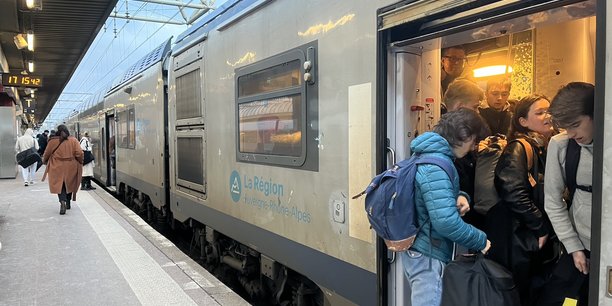The former Prime Minister, Gabriel Attal, carried it as a standard during his trip last May, shortly before the European elections: the Grenoble metropolitan RER would be launched “in 2025” he indicated.
A very symbolic date for this Metropolitan Regional Express Service (SERM) project, initiated several years ago. From now on, it is the most mature of the six SERMs certified in June in Auvergne-Rhône-Alpes, out of the 24 RERs planned nationally.
This week, the Grenoble SERM took a further step. The stakeholders in the file have in fact agreed on an agreement for the continuation of the prefiguration studies, thanks to the resources of the Société des Grands Projets (SGP), SNCF Réseau and SNCF Gares & Connexions, but also the Union mixed mobility in the Grenoble area.
Its envelope, of 1.4 million euros, comes 50% from the State, 25% from the Region and 25% from local authorities, including the department of Isère and Grenoble Alpes Métropole.
Continue studies
Concretely, these studies will support the project, which aims to run a train every quarter of an hour on certain axes of the urban area, initially between Grenoble and Grésivaudan.
For Christophe Ferrari, president of Grenoble Alpes Métropole, this signature – the first in the region – is “ an important step » car « it allows us to move forward on the financial model, conditions and governance ».
Jean-François Monteils, chairman of the board of directors of the SGP (formerly Société du Grand Paris), adds that Grenoble is “ in the first cities of France » to reach this milestone, after Lille or even Rouen.
« Prefiguration is the manifestation of a common will. When we have communities that don’t just say it, but put money into doing it, that’s called proof of love. ».
“This requires enormous political efforts », adds the president of the SGP, whose conference of financiers, which was to be held in September, was finally postponed to the end of the year.
Waiting for CPER Mobilités
In the meantime, after this convention, the time for work will come. However, for the moment, “ we have no funding for infrastructure », deplores Christophe Ferrari.
Part of the envelope should come from the “mobility” section of the Regional State Plan Contract (CPER). In Auvergne-Rhône-Alpes, an agreement worth 1.38 billion euros (including 322 million euros for the SERMs, or 23% of the program) was also signed last May between the Region and the ‘State. But for the moment, the exact version of the program is only announced in mid-2025. Either ” a slow race » points out Cécile Michel, co-president of the Les Ecologistes group at the regional council.
Transport: expected around the corner, will the CPER Mobilités Auvergne-Rhône-Alpes put the Metropolitan RERs on track?
And for good reason, it has not yet been developed, confirms Frédéric Aguilera, vice-president of the Auvergne-Rhône-Alpes Region, delegate for transport. Between the dissolution of the National Assembly and the formation of a new government,
« we were a little late “, agrees the elected official, who clarifies the calendar: ” on the method, we will tour the 12 departments in the coming weeks to develop this roadmap and look at how to ventilate ».
Then, the consolidated roadmap will be sent to the High Environmental Authority, “ who will analyze it for two months ». Following which, regional elected officials will be presented to the vote, « roughly summer 2025 “. In the meantime, other conventions should be concluded on the preliminary studies of the five other regional SERMs (Lyon, Saint-Etienne, Clermont-Ferrand, Chambéry, Genève-Annemasse) hopes Frédéric Aguilera.
A “triptych” to consolidate
“State-Region-Metropolis: it’s the triptych, if you don’t have this key, you will have nothing! », also wishes to underline the president of the SGP. However, the budgetary context questions the actors: what will be the participation of the State, which has a limited wallet? The question of “prioritization” of projects animated the debates of the Urban France Days, last week.
François Durovray, new minister responsible for transport, until then president of the department of Essonne, clarified that “ the first decision to make is on the maturity of the projects ».
“24 SERMs are certified in France with different degrees of progress. It is not up to me today to say which SERMs are priorities or not, it depends on the dialogue with the territories.” Before continuing: « Perhaps rather than moving forward on all the subjects at once, we will say for some that it is rather a little later. But we will progress well and better on the others ».
Budget 2025: “it’s an extremely brutal ax that falls” for metropolises
The minister also outlined, in front of the elected representatives of France Urbaine, some “tracks” for financing SERMs: allocating part of the ETS, “ the famous carbon quotas », to mobility, or even Energy Saving Certificates (CEE). Likewise, the minister also indicated that he saw a budgetary “opportunity” in the end of motorway concessions from 2031… “ These are tracks (…) The subject is to have a roadmap that is no longer subject to the vagaries of annual budgets ».
Elected officials, for their part, expect a firmer position regarding the costs to be incurred.


